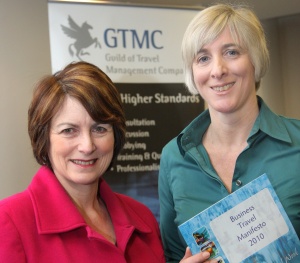GTMC launch business travel manifesto

The Guild of Travel Management Companies launched its first ever Business Travel Manifesto yesterday (January 26).
The manifesto – compiled from a survey of 1,250 business travellers – calls on the Government to tackle a number of transport-related initiatives including creating a high-speed rail network.
The manifesto was endorsed by the Chairman of the Transport Select Committee, who spoke at the launch.
Louise Ellman, MP, said: “The Manifesto talks about the importance of connectivity and we agree with that.
“It’s something our committee will take note of.”
ADVERTISEMENT
“I wish you well with it and I congratulate you on the first work which addresses this issue.”
Ellman also encouraged the GTMC to start campaigning now to try and get some of the demands heard.
She also indicated that Transport was likely to be one of the departments whose budgets would be cut after the election.
GTMC chief executive Anne Godfrey said: “The delivery of the GTMC Business Travel Manifesto has provided real insight and clarity on what the business traveller wants to be achieved by the future government.
“We hope our lobbying efforts in the next 18 months will make a real difference to the experience of the UK business traveller.”
The main demand from survey respondents was the introduction of high-speed rail.
Seventy per cent said it should be a priority for government investment – more than the number which called for UK airport expansion.
A further 60% said high-speed rail when asked what infrastructure would make the biggest difference in terms of their ability to travel on business.
Travellers also criticised the high cost of rail fares, in particular those booked near the day of travel.
In terms of air, the survey destroyed the idea that business travellers travel in business class, with half travelling in economy class on scheduled airlines, and 20% using no frills carriers.
Just 16% of respondents fly in first and business class.
The majority of respondents were not happy with the airport environment as a place to do work (outside of business class lounges) and were frustrated by the time it takes to move through airports, although largely satisfied with security measures.
They want wi-fi, access to work stations and power points (also a requirement at trains and stations), appropriate levels of staff to minimise queuing and effective routing of passengers through airports.
Delays remain the biggest frustration for the business traveller.

